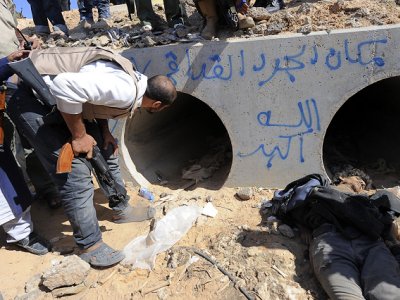
WHEN THE MIGHTY LOSE THEIR THRONES
Mobile footage of the end of tyrants makes for compelling TV and leaves the sour aftertaste of voyeurism in the mouth.
It was the first image of its kind to lodge in the imagination of this generation. The recently executed body, with its disfigured face, was nonetheless recognisably the tyrant whom millions had feared, whose arbitrary rule and secret police separated neighbours from one another in mutual suspicion.
Christmas Day 1989. The day Nicolae Ceausescu died, summarily executed by the hastily assembled opposition forces in Romania.
The humbling of tyrants has become something of a trend since, with a difference. The grainy black and white snap of Ceausescu is now replaced with the shaky but unmistakeable footage of the mobile phone. The judicial execution of Saddam Hussein was secretly filmed by one of the Shia Iraqis present at his hanging. While western audiences were spared images of the drop, the altercation between Saddam, moments before death, and his implacable opponents was broadcast to millions in Britain alone. And everyone watched because they hated him and the scene was gruesomely compelling: a reversal of fortune for the sadist who condemned thousands to die violently.
Then came Muammar’s turn. It was a downfall of almost biblical proportions for the man who claimed he would hunt his enemies like rats to be found cowering in a sewer. In the hours and days which followed, more video footage was broadcast across the world. The images were confusing, wobbly and disconnected but they revealed to anyone who could read human emotion the last moments of a man who was dazed and shocked by a recent air strike on his motorcade and atavistically terrified at the barbarism awaiting him. However grotesque Gaddafi’s ending transpired – and there were indications that it got far nastier than a mob beating – few people cared and most rejoiced at the humiliation of a cruel and capricious despot.
The emotional responses of some Libyans was bound to be, in part, violent and unpitying, for this was the ending of a man who had haunted even their subconscious. But what of those who watched the images over their TV dinners elsewhere? These are difficult judgments for TV editors to make. The British are relatively circumspect in these matters, governed by cautious guidelines. Nevertheless, in the age of competitive 24 hour news, the pressure to deliver compelling images to hungry viewers is unrelenting. And most of us watched, even against our better judgment.
Some will argue that there is something too richly satisfying about the humiliation of a tyrant to be fussy over morals, but the indications are that the lust for shocking images goes deeper. The innocent businessman Ken Bigley was beheaded by Al-Qaeda in Iraq and his obscene demise posted on the internet. It went viral. Only a few viewers would have been latent jihadists. Most were expressing a ghoulish curiosity and a number repented subsequently, describing how unworthy they felt to have succumbed to the temptation to watch.
It is likely we will see more, much more of this in the years ahead as so-called citizen journalism extends its reach. The pressure on TV editors will grow because material is so freely available online where most people are glued anyway. Most of us feel our weakness in this matter. We know we shouldn’t but we risk the look. No wonder violence is frequently described as pornographic. The encounter diminishes the consumer because it asks them to objectify others, showing contempt for the depth of their humanity.
The brutal death of Gaddafi might provoke our imaginations more fruitfully, for it was a faithful demonstration of the extent to which people’s base instincts are unleashed in war. There is nothing surgical and incisive about human conflict. It spills over in bloody acts of cruelty which invariably target the poor and vulnerable. In Darfur and Congo, there are thousands of innocent people who meet their fate like Gaddafi. There are no cameras to record it, because these crimes must be hidden to protect the perpetrators. In their name, if no other, we might use the death of tyrants to remind us to lament and intercede for their suffering.
The demise of tyrants carries the echo of Mary’s song: ‘he has cast the mighty from their thrones’ (Luke 1:52). When we share in the joyful words of Mary’s prayer in Christian worship, we rarely stop to think what happens after the powerful lose their immunity in this world. The one man who voluntarily left his throne to put his life at risk experienced the vengefulness of mob justice. He chose to save his people rather than be saved from them. Thank God the death of Jesus could not have been recorded. Sometimes things are best left to the imagination.
POPULAR ARTICLES

Obama's Covert Wars
The use of drones is going to change warfare out of all recognition in the next decades.

Through A Glass Starkly
Images of traumatic incidents caught on mobile phone can be put to remarkable effect.

What Are British Values?
Is there a British identity and if so, what has shaped the values and institutions that form it?


